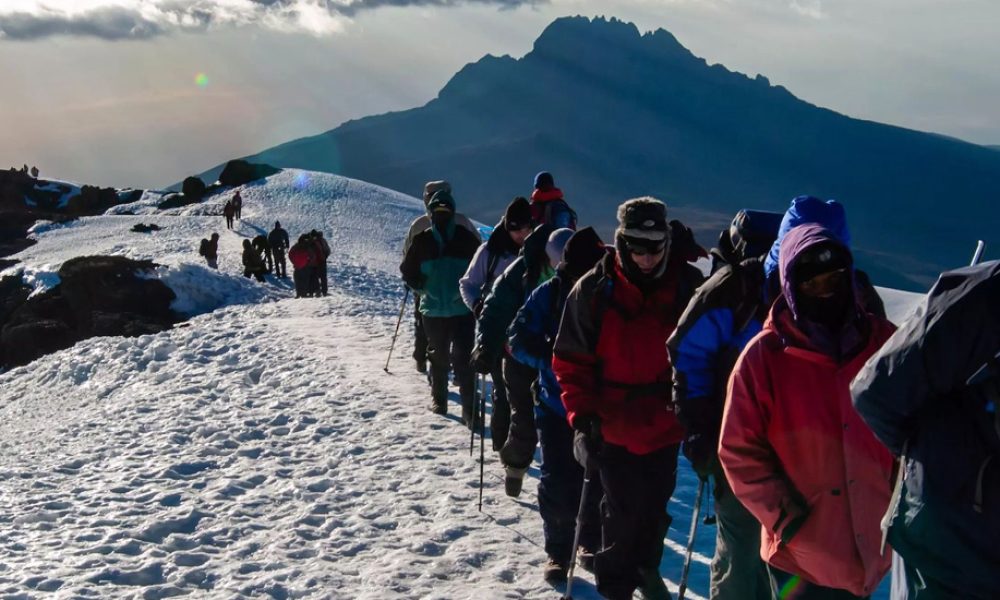Call /WhatsApp: +255 788 738494

For this to be sure of Mount Kilimanjaro Safety as Kilimanjaro is One of the Seven Summits, Kilimanjaro is the highest mountain in Africa, and at 19,341 ft, the summit falls into the “extreme altitude” mountaineering category. It’s one of the few mountains of this size that requires no technical skill to reach the summit.
It should not be underestimated. Trekking at altitude in a remote location can be dangerous, and every year it’s estimated over 1,000 people are evacuated from the mountain and sadly, some never return to their families.
Staying safe on Kilimanjaro starts with understanding the risks and knowing how to mitigate them. We ask all our climbers to fill in a comprehensive medical questionnaire, and in the case of some pre-existing conditions, we may ask for confirmation from your doctor that you are fit to climb. Your guide will need to know any existing medications you are taking (including over the counter) and whether you are taking Diamox to help acclimatization
You need to know that your guide has the proper training to know how to detect the early signs of altitude sickness, and what to do about it. Our guides undergo Wilderness First Responder training, which teaches essential skills for managing medical conditions in remote locations.
We’ve partnered with the Sentinel Outdoor Institute, a high-altitude medical training organization who run in-depth training courses in Tanzania to ensure our guides are kept up to date with emerging medical protocols.
Carrying emergency equipment is useless if your guide doesn’t know how to use it.
It’s our mission to ensure a safe and successful summit for everyone. We have a guide to climber ratio of 1 to 2, so for every two climbers, we have one trained mountain guide. This allows for more careful observation and evaluation of the group’s condition.
Communication with your guide is important. If you’re feeling under the weather, have a headache, nausea or any other symptom, you must tell your guide. While hiking, your guide will be keeping a lookout for any early signs of trouble:
Every day, you’ll have a one-to-one meeting with your guide for a comprehensive health check-up:
Constant monitoring prevents a mild case of altitude sickness from escalating into an emergency.
Our team carries a comprehensive medical kit, including bottled oxygen, and portable stretcher.
In the event of an emergency, we use https://kilimedair.co.tz/, a search and rescue service that operates out of Moshi. Within 5 minutes of a distress call, a helicopter will be dispatched to the nearest landing point and the patient can be airlifted off the mountain and taken to hospital or the High Altitude Medicine Clinic.
It’s important that you take responsibility for your safety, including:
Trekking on Kilimanjaro takes you through five major climate zones, from the warmth of the low slopes to the bitterly cold, sub-zero temperatures at the summit.
In addition to the medical and emergency equipment, the quality of kit used in camp is also an important consideration. Weather on any mountain can be unpredictable, and keeping safe, warm, and dry at night is imperative to the health of any climber.
Rugged tents suitable for changing mountain conditions, that stay dry even in torrential rain
Comfortable waterproof dining tent with table and chairs
Sanitary toilet facilities
Arriving for a Kilimanjaro climb without proper cold-weather clothing, adequate hiking boots or a sleeping bag appropriate for expedition conditions is asking for trouble. We’ve put together a comprehensive packing list for Kilimanjaro explaining what you need and why.
If you haven’t got the right boots, you can easily turn an ankle or injure yourself on the rocky trails
Without effective rain gear, you’ll get soaking wet and quickly turn hypothermic
If you don’t protect yourself from the sun, you can end up with a nasty case of sunburn or sunstroke
Never stay in wet clothes
Our Kilimanjaro packing list details everything you need to bring to be properly prepared
There are no showers on Kilimanjaro, and we recommend you bring hand sanitizer and wash your hands frequently, especially before you eat. A combination of being tired from hiking, altitude, and dietary changes can make you more susceptible to traveler’s diarrhea or other ‘stomach bugs’.
Eat regularly, even if you think you’re not hungry, this keeps your energy levels up
Drink plenty of water, dehydration will quickly lead to fatigue and can compromise the acclimatization process
We go to great lengths to ensure your food is prepared safely, to avoid gastrointestinal problems. We boil, filter and purify all drinking water, including the water used to wash food products.
By providing private toilet tents for our climbers, we avoid the unsanitary conditions found in some of the public facilities at the campsites.
Safety begins at home, before you arrive in Tanzania.
Medical check-up from your doctor, discussing any existing medical conditions or medications you’re taking
Kilimanjaro Recommended vaccinations and for the areas you are traveling to
Consider taking Diamox to help acclimatization, discuss this with your doctor for any interactions with existing medications
Arrange your travel insurance for Kilimanjaro Climb – it’s mandatory to have comprehensive travel insurance to cover emergencies
You should have a good standard of fitness in order to hike over rugged terrain for multiple days. While it’s not technical, the hiking is tough and exhausting. Start your fitness program well ahead of your climb, follow our complete guide to training for Kilimanjaro.
We take your safety very seriously and don’t believe in leaving anything to chance. Emergencies can and do occur, due to the nature of the remote, high-altitude environment. Climbing Kilimanjaro with an operator who has well-trained guides, robust safety procedures, and good quality equipment reduces the incidence and severity of any issues that arise.
You can prepare yourself by being fit, bringing the right gear, and taking adequate precautions on the trail.
Do you need help?
Send us details